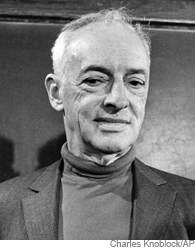“The backbone of 20th-century American literature”—this was novelist Philip Roth’s assessment of Saul Bellow. His struggle with modernism, his Jewish upbringing, his feelings of alienation and his mighty individualism figure greatly in his works. The city of Chicago, where he lived for a good portion of his life, shaped both his psyche and his novels.
Saul Bellow’s Early Days
Born Solomon Bellows on June 10, 1915, in Lachine, Quebec, near Montreal, Bellow was 9 when he moved with his parents, Liza and Abraham, and three older siblings to Chicago. Saul’s mother, who had emigrated with her husband from Russia, died when Bellow was 17. This tragedy, along with the loss of neighbors in the influenza epidemic of 1918, deeply affected Bellow and, perhaps, hardened him.
In college, moved by writers like Upton Sinclair, Bellow expressed his urge to write, but a professor dissuaded him, saying a Jew wouldn’t be able to understand English literature. At the University of Chicago and at Northwestern University, where he later transferred, Bellow studied anthropology and sociology instead. “The Hell it Can’t,” Bellow’s first published story, won third prize in The Campus in Print Story Contest at Northwestern University.
Bellow worked odd jobs, taught classes and involved himself in one of Roosevelt’s WPA projects, The Federal Writer’s Project. He served as a merchant marine during World War II, and wrote his first book, “The Dangling Man.” He spent most of the ’40s and ’50s writing in either Paris or New York.
Literary critic and biographer Alfred Kazin described a walk he and Bellow took across the Brooklyn Bridge, just after Bellow arrived in New York from Chicago: “He was measuring the world’s power to resist him, he was putting himself up as a contender.”
Sources in this Story
- Jewish Achievement: Saul Bellow
- The Boston Globe: Saul Bellow, novelist who charted ironies of modern soul, dies at 89
- Salon: Bellow and Me
- Time: Part Wise Man, Part Wiseguy
- The Nobel Foundation: Saul Bellow–Nobel Lecture
- New York Times: Saul Bellow to Receive Special Literary Medal
- NPR: Saul Bellow’s Novels Tackled Life’s Contradictions
Bellow’s Literary Career
It wasn’t until his third novel, “The Adventures of Augie March,” that Bellow found his writing voice. According to biographer James Atlas, it “combined the rhetoric of a precocious University of Chicago student with the exuberant syncopations of Chicago street talk—high and low.”
Atlas also noted that “Herzog,” written about a scholar in crisis who was perpetually bickering with his friends, family and lovers, was his greatest commercial success. Ironically, it mirrored Bellow’s own personal and romantic life. He married five times and fathered four children—all boys, except for one daughter, Naomi Rose, born in 1999.
Bellow was awarded three National Book Foundation awards: one for “The Adventures of Augie March,” (1953) another for “Herzog” (1964) and a third for “Mr. Sammler’s Planet.” (1970). He was also awarded a National Book Foundation medal for distinguished contribution to American Letters and the Nobel Prize. In his Nobel acceptance speech, Bellow spoke of the writer’s method; or, more nearly, his responsibility.
“The essence of our real condition,” he said, “the complexity, the confusion, the pain of it is shown to us in glimpses, in what Proust and Tolstoy thought of as ‘true impressions.’ …A novel moves back and forth between the world of objects, of actions, of appearances, and that other world from which these ‘true impressions’ come and which moves us to believe that the good we hang onto so tenaciously—in the face of evil, so obstinately—is no illusion.”
In “Conversations with Saul Bellow,” Bellow explained what it was that separated him from other famous writers such as Hemingway and Joyce: “I don’t see that we need to call for the destruction of the world in hope of a phoenix. If I am not a romantic, it is for this reason … I may be disappointed in existence—but I feel I have a right to demand something other than romantic disappointment.”
The Man and His Work
The Rest of the Story
Saul Bellow died on April 6, 2005, at the age of 89. In addition to a short obituary lauding his accomplishments, NPR hosts readings from a few of Bellow’s books: “Herzog,” “The Belarosa Connection” and “A Theft,” a novella published in 1989.
This article was originally written by Shannon Firth; it was updated May 18, 2017.











